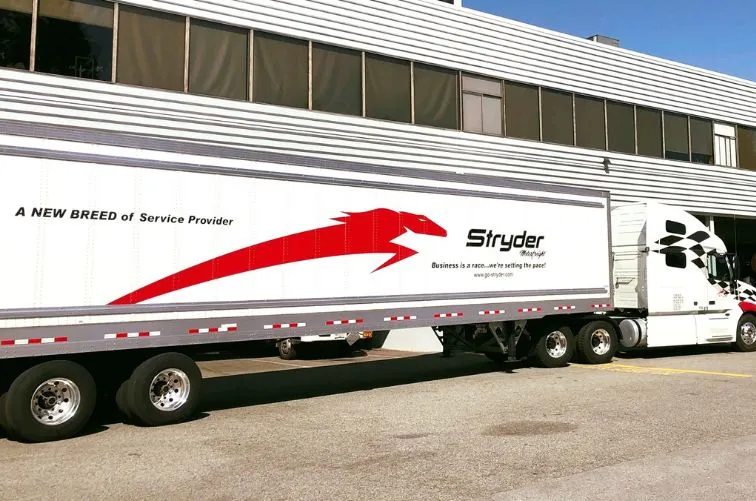Freight transportation is the backbone of global commerce, enabling the movement of goods across cities, countries, and continents. Freight transportation is a key component of a logistics system that ensures that businesses and consumers receive what they need efficiently, from raw materials to finished goods.
Let’s break down what freight transportation is in-detail, the types of transport, and key freight transport services provided by logistics companies.
Freight Transportation Meaning & How It Works
Freight transportation refers to the process of moving goods (or freight) from one location to another using various modes of transportation, including trucks, trains, ships, and planes. It plays a crucial role in international trade and supply chain operations, connecting manufacturers, suppliers, and consumers.
The freight transportation process begins with shippers (businesses or individuals) contracting a freight forwarder or carrier to handle their goods. Factors like shipping cost, delivery times, and cargo size determine the mode of transport.
For example, perishable items like food and beverages, or pharmaceuticals often rely on air transport for time-sensitive deliveries, while bulk commodities like coal or grain may use rail freight or ocean freight. Advanced technology, such as real-time tracking, helps optimize transportation operations and meet business objectives.
4 Main Types of Freight Transportation
The four primary modes of freight transportation are:
1. Road Transportation
The most flexible and widely used option, road transport involves trucks moving goods via highways and local roads. It’s ideal for short to medium distances and offers a combination of road routes for expedited freights. However, factors like fuel prices, traffic, and weather conditions can impact delivery times. Truck drivers and asset-based trucking companies ensure goods reach destinations safely, whether as Less Than Truckload (LTL) or Full Truckload (FTL) shipments.
2. Rail Freight (Intermodal Rail)
Rail freight excels in moving bulk commodities like minerals, grains, and hazardous materials over long distances. Intermodal transportation—using standardized containers that transfer between trains, trucks, and ships—reduces costs and environmental impact. For instance, intermodal rail is key for cross-border shipments between Canada and the United States, offering a balance between speed and minimum cost.
3. Ocean Freight
Responsible for 90% of global trade, ocean freight relies on cargo ships to transport massive volumes of goods, including bulky items and individual items in intermodal containers. While slower than air transport, it’s cost-effective for international shipments, especially across the coastlines of countries. Ports like Vancouver handle significant annual freight tonnage, linking North America to global markets.
4. Air Freight
The fastest mode for urgent or high-value goods, air freight connects airport locations worldwide. Though expensive, it’s indispensable for industries needing real-time inventory management. Companies like Uber Freight leverage advanced technology to optimize air cargo facilities and meet tight time periods.
Specialized Freight Transportation Services
Beyond the four principal types of transport, specialized freight transportation services are available for specific needs, each with their own advantages:
- Less Than Truckload (LTL) & Full Truckload (FTL): LTL consolidates smaller shipments into one truck, reducing costs for shippers. FTL dedicates an entire truck to one shipment, ideal for large volumes or hazardous materials.
- Cross-Border & Long-Haul: Managing customs, tariffs, and regulations for international shipping requires expertise. Long-haul services cover vast distances, often combining transport modes for efficiency.
- Cross-Docking: Cross-docking is a logistics strategy that minimizes storage by transferring goods directly from inbound to outbound vehicles, cutting transportation costs and fuel consumption.
- Expedited Freights: For urgent deliveries, at a premium cost, expedited services use air transportation or schedule freight transport for off-peak road hours to meet tight deadlines.
Freight Transportation Company in BC: Stryder Canada
Stryder Canada provides reliable access to freight services in Western Canada for businesses in need. Based in Metro Vancouver and Calgary, freight transportation services we offer include cross-border Canada-USA road transport, intermodal shipping solutions, and both LTL & FTL modes of truck transport. Through Logic-ology, we can provide a freight network which integrates road segments, rail, and ocean to ensure seamless supply chain operations from Canada, USA, and Mexico. For beverage distributors, we have dedicated warehouse facilities with infrastructure designed specifically for beverage products, along with repackaging services and reefer vehicles to ensure that the goods maintain the highest product quality for consumers.
As international trade grows, so does the need for efficient transportation solutions. Partnering with Stryder Canada, a trusted freight transportation company in Metro Vancouver, bridges the gap between your business objectives and supply chain success.
Contact us today at 833-787-9337 or sales@go-stryder.com for more information or to book a site visit!


Recent Comments